How to Start a Tour Business in 2025: Practical Guide

How to Start a Tour Business in 2025: Practical Guide
Starting a tourism business is an exciting journey into a landscape full of potential. Travellers are always looking for new adventures, and there is no shortage of niches to explore in the tourism industry. The question is: how do you carve out your place in this vibrant sector?
Understanding the tourism landscape isn’t just about launching a business; it’s about positioning yourself strategically in a market that is constantly evolving. Whether you are planning on offering food tours, cultural excursions, adventure experiences, or something more niche and unique, your success will be rooted in your ability to identify and embrace your niche.
Understanding Your Niche and Why It Matters
The first step to starting a successful tour business is identifying your niche. The tourism landscape is incredibly diverse, and travelers today are not interested in the same-old-same-old experiences. They want something different that speaks to them, something that feels unique and authentic.
Whether your passion lies in food, history, adventure, or cultural storytelling, your niche is your starting point. Once you identify your niche, it becomes the core of your business, everything from your marketing to your operations will revolve around it. Your personal point of view and the way you tell stories within that niche will distinguish you from competitors, making your tours memorable and setting you apart.
As noted by experts in niche marketing, "Niche marketing in tourism is about attracting more specific groups based on the experiences they're seeking." By focusing on specialized interests, businesses can effectively connect with targeted audiences, fostering deeper engagement and loyalty. This approach underscores a profound truth about today's tourism landscape.
The Importance of Market Research: Understanding Your Potential Customers

Before you launch your tour company, it's essential to understand your market and know who your ideal customers are. Understanding the demographics and psychographics of your target audience will guide your decisions and help you tailor your marketing strategy, tour offerings, and even customer interactions. This insight can make all the difference when it comes to customer satisfaction and repeat business.
Travellers today are more discerning than ever, and they don’t just choose a destination, they choose experiences. The younger travellers are driven by curiosity, social media, and a desire for deeper connections with the places they visit, and are actively seeking experiences that are immersive, authentic, and unique.
To better understand your target market, you can conduct market research in a variety of ways. Start by sending your tour scripts to friends and acquaintances for feedback. Ask them for constructive suggestions and critique. This process will not only help you fine-tune your offerings but will give you insights into how others perceive your concept.
Additionally, consider using tools like Google Forms or Zapier to send out surveys to your community groups or social networks. Social media is a great way to engage with potential customers, and these interactions can give you insights into what your target audience is looking for in a tour.
Don't forget to look at reviews of similar tours on platforms like TripAdvisor, Yelp, and Google Reviews. Identifying common themes in customer feedback will allow you to learn what people enjoy and, just as importantly, what they don't enjoy.
You can also refer to consumer research platforms like Arival, which regularly provides insights into what travelers are prioritizing in their experiences. From sustainability to technology enhanced tours, understanding these shifts in consumer preferences will help you shape your offering to meet current demand.
Consider the example of Fairview Limousine, a Rocky Mountain tour and shuttle company. Initially operating with manual booking processes, Fairview recognized the need to adapt to their customers' desires for more efficient and accessible services. By integrating Zaui's dynamic pricing platform, they not only streamlined their operations but also increased revenue by 20% during peak months. This adaptation demonstrates the importance of aligning business practices with customer expectations to achieve success. For those still determining their niche, it's evident that travellers desire tours that are authentic, immersive, and convenient. They expect easy online booking and increasingly prioritize eco-friendly and sustainable travel options, particularly among Millennials and Gen Z travelers. Tailoring your tours to meet these demands will provide a competitive edge in a thriving industry.
The tourism business is a thrilling, ever-changing landscape that offers boundless opportunities for those willing to step in and embrace it. By identifying your niche, understanding your market, and developing a solid business plan, you are positioning yourself for success. But perhaps most importantly, remember to stay adaptable.
As the tourism landscape continues to evolve, so too should your approach. Be prepared to pivot when necessary, whether it’s responding to market shifts, customer feedback, or global trends. Your passion, combined with a keen understanding of what your customers want, will be the key to your business thriving.
So, take the leap. Understand your niche, plan for success, and embark on this exciting journey of starting your own tourism business. With the right mindset, a clear vision, and a willingness to adapt, you can turn your passion for travel into a thriving, successful venture.
Understanding the Financial Aspect to Start Your Tour Business
Starting a tour business is an exciting and rewarding journey, but it’s important to understand the financial side of things to ensure your success. While the idea of showing people the world is thrilling, the reality is that a well thought out financial plan is just as important as your passion for travel and adventure. From startup costs to ongoing expenses, pricing strategies to licensing requirements, every financial decision you make will directly impact your ability to run a successful tour business.
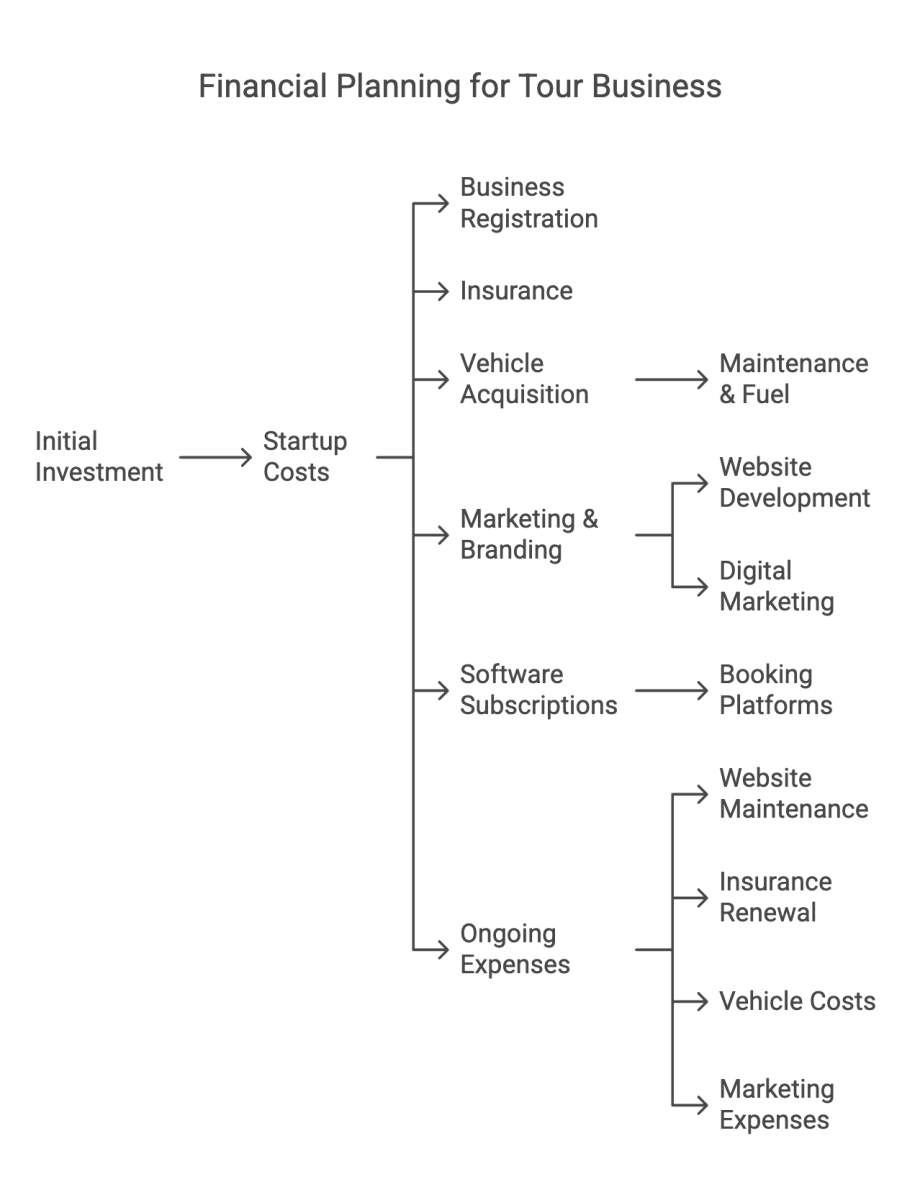
How Much Does It Cost to Start a Tour Business?
Starting a tour business requires an upfront investment, and costs vary depending on the type of tour operation you plan to launch. For walking tours or bike tours, the initial expenses may be relatively low, typically ranging between $2,000 and $10,000. However, vehicle based tours, such as guided shuttle services or adventure excursions involving boats or off-road vehicles, will require a significantly higher investment.
One of the first expenses to consider is business registration and licensing. Depending on your location, registration fees can range from $100 to $1,000. Insurance is another essential expense, with annual premiums typically falling between $500 and $2,000, covering liability and vehicle-related risks
If your tour business involves transportation, vehicle acquisition is one of the biggest costs. A used passenger van can cost anywhere from $15,000 to $30,000, while a new model may exceed $50,000. Leasing is another option, but it introduces a recurring financial commitment. Vehicle-related expenses don’t stop at the purchase, maintenance and fuel add ongoing costs, with annual maintenance averaging $1,000 to $2,000 and fuel expenses varying based on usage and fluctuating gas prices.
Marketing and branding also require an initial investment. A well-designed website can range from $500 to $5,000, depending on complexity, while branding and advertising expenses may cost between $2,000 and $10,000 in the first year. Digital marketing, including social media ads and Google PPC campaigns, may require a monthly budget ranging from $500 to $2,500.
Your initial expenses go beyond marketing and include software subscriptions for booking and customer management. Booking platforms typically range from $50 to $200 per month, depending on the features required. You can minimize this cost by opting for a free model that takes a small percentage of your bookings instead of a fixed monthly fee. If you plan to hire staff, tour guide salaries and administrative wages must be factored in, though these expenses will vary based on your business model and location. Choosing an advanced reservation platform like Zaui can help reduce operational costs by providing efficiency tools that streamline workflows and improve resource management. By leveraging the latest reservation technology, you can optimize bookings, automate tasks, and enhance overall business performance.
Office-related costs depend on whether you work from home or lease commercial space. Many operators keep overheads low by working remotely or using coworking spaces. However, if a storefront or customer-facing location is necessary, rent and utilities should be included in your budget.
The total cost of launching and running a tour business depends on your specific business model. Careful financial planning ensures a smooth launch and long-term sustainability. Investing in the right tools, marketing strategies, and operational efficiencies will help improve profitability and growth.
Ongoing Expenses for Your Tour Business
Once your business is up and running, you’ll face ongoing expenses that you’ll need to account for. Many of these are essential to keep your company operational and provide your customers with a seamless experience. For example, maintaining a website will incur regular costs for hosting, updates, and any additional functionality you may require as your business grows. Your scheduling software will also come with an ongoing cost, as it will be essential to manage bookings and tours effectively. Additionally, you’ll need to maintain your insurance policy to protect both your business and your customers.
If you’ve invested in a company car, you’ll have car-related expenses to consider, including payments, insurance, fuel, and maintenance. These costs can add up quickly, so it’s important to factor them into your budget. The costs will also vary depending on how much you drive and how frequently the vehicle is used for tours.
In addition to these core costs, you will need to budget for advertising and marketing. Whether it’s running digital campaigns or printing promotional materials, ongoing advertising will be crucial for attracting new customers. If you're operating from home, you'll save on rent and utilities, but the rest of your expenses,especially those tied to your tours themselves,will be a constant consideration.
Hiring Tour Guides: Contractors or Full-Time Employees?
As your business grows, you may decide to hire tour guides to help run your tours. One of the significant financial decisions in this process is whether to hire guides as contractors or full-time employees. There are pros and cons to both options, and the decision largely depends on the nature of your business.
Hiring freelance tour guides as contractors can be a cost-effective option, especially if you’re running a seasonal business or only need guides during peak times. With contractors, you’re not obligated to provide benefits like health insurance, which can help save on expenses, particularly when your business is still in the early stages. However, working with contractors means you’ll need to continuously recruit and train new guides, as turnover can be high in the tourism industry.
On the other hand, hiring full-time employees offers more stability for your business. Full-time guides are likely to stay with your company longer, providing continuity for your customers and helping to create a more consistent experience. However, this option comes with additional costs, such as providing benefits, payroll taxes, and other associated costs of having employees. If you operate in an area with year-round demand for tours, full-time staff may be the better choice.
Alternatively, if you’re operating in a place with clear peaks and valleys in demand, seasonal hires could be a great way to balance costs with demand. This flexibility can be essential for managing your budget, especially if you experience fluctuations in business during different times of the year.
Pricing Your Tours
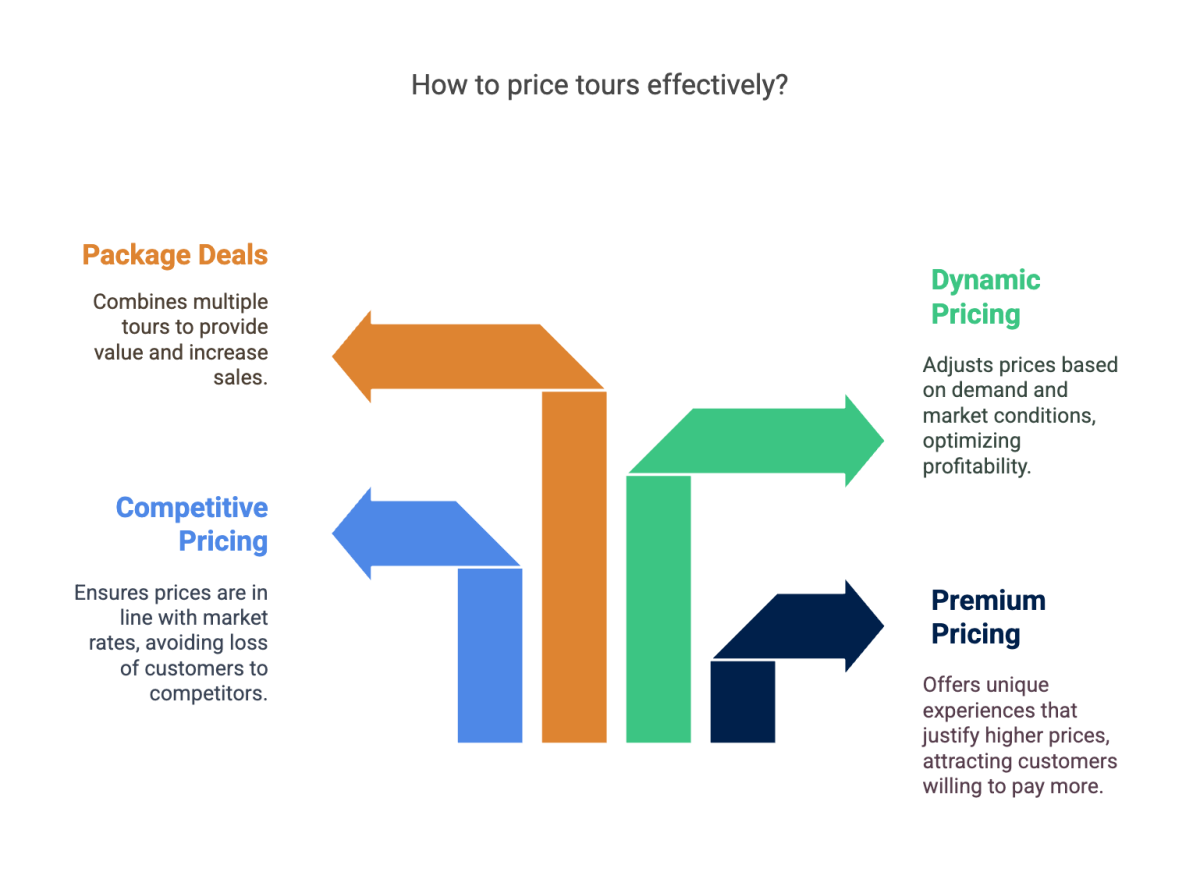
Pricing your tours is one of the most critical financial aspects of your business. The price of each tour needs to reflect the quality of the experience you're offering while ensuring that your business remains profitable. When setting your prices, several factors should be considered.
First, think about offering premium tours that stand out from the competition. Premium experiences,such as private tours, VIP access, or luxury excursions,allow you to charge more for a unique experience. Many travelers are willing to pay a premium for a personalized, high-end tour that offers more than what typical tours provide.
At the same time, you need to ensure your prices are competitive with other operators in your area. A competitive pricing analysis is essential to ensure you’re neither undercharging nor overcharging. If you charge too much, you may price yourself out of the market; if you charge too little, you may struggle to cover your costs.
One way to easily manage this balance is by utilizing you scheduling software’s Dynamic Pricing tools . This powerful feature allows you to automatically adjust your pricing based on demand, time of day, seasonality, or other factors. It helps ensure that you remain competitive and profitable by dynamically setting prices that reflect market conditions. Whether it’s during peak tourist season or at off-peak times, dynamic Pricing helps you stay responsive to demand changes, offering optimal prices to both you and your customers.
Another pricing strategy to consider is offering tour packages. Combining multiple tours or experiences into a package deal encourages customers to spend more while giving them better value for their money. For example, offering a multi-day tour package or bundling a city tour with a culinary experience can attract larger groups and increase overall revenue.
For group bookings, you may also want to offer discounted group rates, which can be an attractive option for corporate outings, school groups, or large family tours. This flexibility in pricing can help you appeal to different market segments, from budget-conscious travelers to those looking for more exclusive experiences.
Understanding the financial aspect of your tour business is crucial to ensuring its success. From the startup costs, which can range from a few hundred to several thousand dollars depending on the type of tour company you’re creating, to the ongoing expenses like website maintenance, insurance, and employee wages, every financial decision you make will impact your bottom line. Additionally, setting competitive prices and obtaining the proper licenses ensures that you stay compliant with regulations and keep your customers happy.
By planning carefully and making informed financial decisions, you can set your tour business up for long-term success, turning your passion for travel and adventure into a profitable and sustainable venture. Managing your costs, understanding your market, and pricing your services effectively will allow you to build a business that not only provides great experiences for your customers but also supports your financial goals.
Your Marketing Checklist to Start Your Tour Business
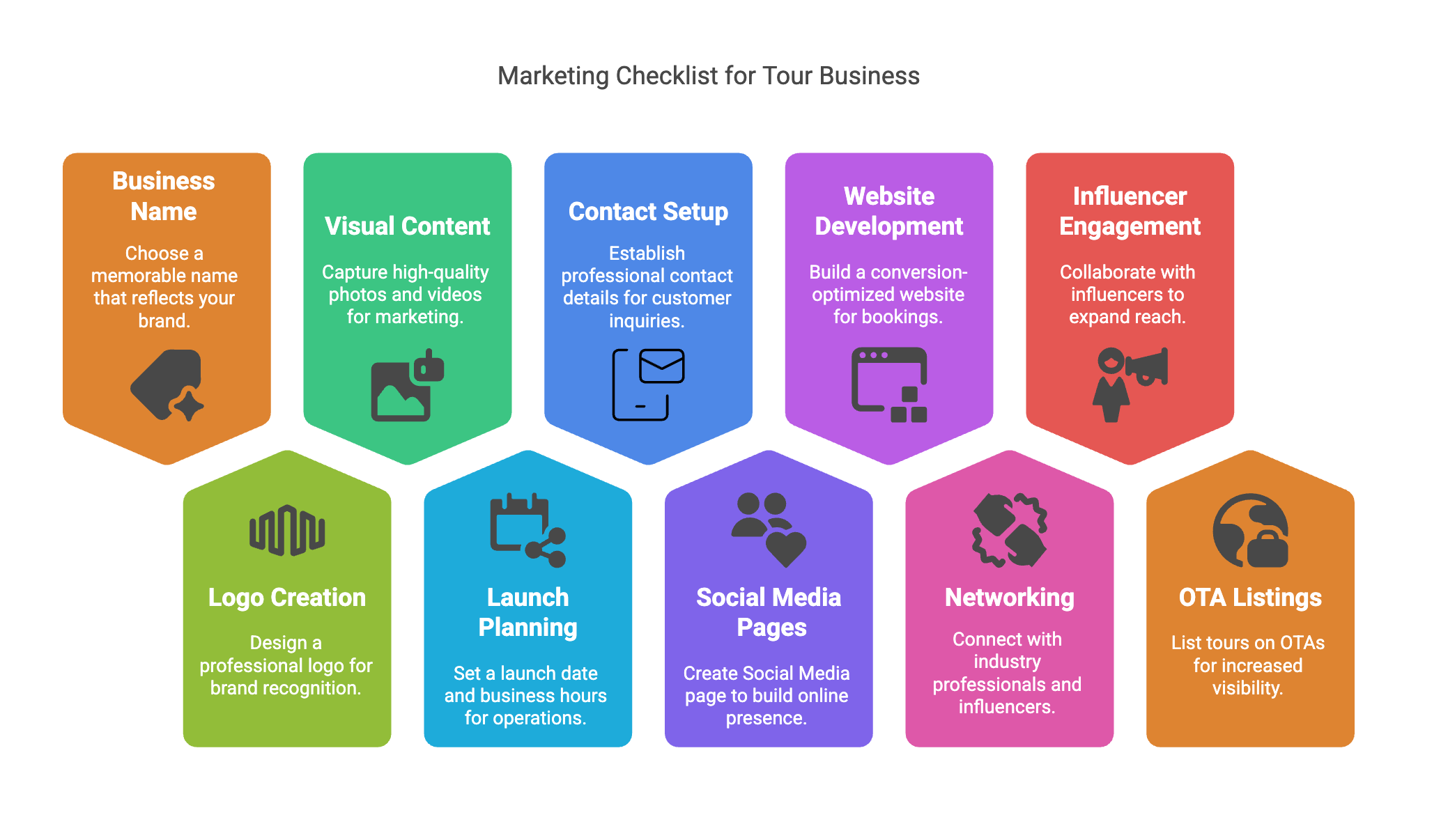
Starting a tour business is an exciting journey, but to ensure its success, a solid marketing strategy is key. Whether you’re offering city tours, nature excursions, or unique niche experiences, a strategic approach to marketing can set your business apart from competitors. Here is your Marketing Checklist to get you started:
1. Choose a Memorable Name for Your Tour Business
Your business name is a fundamental part of your brand identity. It should reflect the core values of your business and provide a sense of what you offer. A great name can be the first step in building a lasting connection with your customers. Aim for something catchy, easy to remember, and ideally descriptive of your tour offerings.
The names should convey your brand mantra and should appeal to potential customers seeking unique experiences. After selecting your name, check for domain availability to ensure that you can secure a matching web address.
2. Create a Logo That Represents Your Brand
Once you’ve chosen your business name, it’s time to focus on creating a visual identity. A professional logo plays a critical role in shaping your business’s look and feel, helping customers recognize your brand at a glance. Your logo should be simple, scalable, and able to work across various platforms,websites, social media, and promotional materials.
If you’re not a design expert, tools like Canva can help you create a logo for free, or you can opt to hire a designer via platforms such as Fiverr or 99designs for a more polished look.
3. Capture High-Quality Photos and Videos for Your Marketing Materials
One of the most effective ways to engage potential customers is through visuals. Start taking photos and videos of the locations you plan to visit, your tour vehicles, or even the gear you'll use. Even without actual customers, you can still create an appealing marketing library that showcases the adventure and experiences you’ll provide.
You don’t need to wait until your business is fully operational, having visuals on hand will help you build your social media presence and website in the early stages.
4. Set Your Launch Date and Business Hours
Planning ahead for your launch is essential. It’s recommended to give yourself at least 30 days for promotion before your official tour start date. This gives you enough time to generate excitement and promote your services. As part of your preparations, set clear business hours and an official launch date, and make sure to incorporate this into your website, social media, and other marketing materials.
Zaui’s booking system lets you manage your tour schedule efficiently, making it easy to integrate your operating hours with your online booking platform.
5. Set Up Your Contact Details
At this stage, you’ll need a professional way to communicate with customers. Setting up a simple business email address, such as contact@yourtourcompany.com, is a good start. While you’re building your brand, a basic phone number, perhaps using a prepaid SIM card, will be sufficient to handle inquiries.
This contact information should be prominently featured on your website and social media pages to ensure potential customers can easily reach you for bookings or questions.
6. Create a Facebook Page for Your Tour Business
Creating a Facebook page is an excellent way to start building your online presence. It allows you to provide key details about your tours, interact with potential customers, and share updates and promotions. You can also leverage Facebook’s ad capabilities to target specific audiences, driving more traffic to your website.
Be sure to include essential information on your Facebook page, such as pricing, location, and tour details. Encourage friends and family to like and share the page to boost visibility.
7. Build a Simple, Conversion-Optimized Website
Your website is one of your most powerful marketing tools. Through Zaui’s partnership with OATS Marketing, you can build a professional site with integrated booking capabilities at a discounted rate. A well-designed website doesn’t need to be overly complex, but it should focus on driving conversions by clearly showcasing the value of your tours. Learn more about OATs Marketing here.
Include these key elements on your website:
- An Engaging Headline: This grabs the visitor’s attention and encourages them to explore further.
- Clear Tour Descriptions: Explain the unique aspects of your tours, who they’re best suited for, and why customers should choose you.
- Visually Compelling Media: Use high-quality photos and videos that showcase the best parts of your tours.
- Strong Call-to-Action (CTA): Make it easy for visitors to sign up for updates or book their tours directly on your website.
Zaui’s booking system is fully customizable and integrates into your website, providing a seamless experience for your customers from their first interaction with your brand to the final booking confirmation.
8. Network with Industry Professionals and Influencers
Networking is an essential part of growing your tour business. It’s valuable to connect with other professionals in the tourism and hospitality industry who can offer advice, share their experiences, and potentially refer clients to you.
Consider attending local tourism industry events or conferences where you can meet others in the field. Joining online communities or following influencers in the travel space on social media can also help you stay updated on trends and connect with potential collaborators.
9. Get Involved with Influencers and Attend Industry Events
Engaging with influencers in the travel space can significantly expand your reach. Many influencers specialize in promoting unique tours and experiences to their followers. While you might not always be able to get direct access to influencers for collaborations, following their blogs and social media channels will give you valuable insights into what’s trending in the industry.
Attend local tourism events, industry conferences, and networking meetups to grow your contacts and establish relationships. These events often provide opportunities for collaborations or partnerships that can help expand your business reach.
10. List Your Tours on OTAs (Online Travel Agents)
Maximizing Visibility Through OTAs
To expand your reach and make it easier for customers to discover your tours, listing your business on Online Travel Agents (OTAs) such as Viator, GetYourGuide, is a smart strategy. OTAs have established platforms with large audiences, meaning they can drive significant traffic to your tours.
While OTAs do take a commission, they offer an invaluable opportunity for exposure. Think of it as displaying your products in a large retail store, this helps increase visibility and drive more bookings to your website. Zaui’s integration with OTAs allows you to effortlessly manage bookings from these platforms, ensuring you can efficiently handle both your direct and OTA-generated reservations.
How OTAs Can Benefit Your Tour Business?
OTAs are particularly advantageous for businesses just starting because they already have a strong marketing presence and established customer trust. By listing your tours on these platforms, you tap into their vast customer base and benefit from their extensive advertising budgets. This can significantly boost your business in the early stages, particularly if you’re targeting a global audience or customers who actively search for experiences on OTAs.
Additionally, OTAs like Viator and GetYourGuide offer tools for managing pricing, availability, and customer reviews, all of which can help you optimize your offerings and provide a seamless customer experience.
Successfully marketing your tour business requires thoughtful planning, strategic execution, and leveraging the right tools. From creating a strong brand identity to building a simple yet effective website and engaging with your target audience on social media, each step in the marketing checklist is crucial to laying a solid foundation for your business.
By listing your tours on OTAs and integrating Zaui’s booking and management system into your website, you can expand your reach, increase bookings, and build a loyal customer base. Stay consistent with your marketing efforts, keep engaging with potential customers, and watch your tour business grow into a thriving and successful operation.
How to Legally Set Up Your Tour Business
Starting a tour business is a thrilling venture, but it’s important to ensure that everything is legally in place from the very beginning. Setting up your business properly not only protects you but also builds credibility with your customers. Whether you’re operating locally or expanding globally, navigating the legal requirements can feel overwhelming, but we are here to help streamline the process and keep you on track. Here's a step-by-step guide to help you legally set up your tour business with the right structure, insurance, and operational permissions.
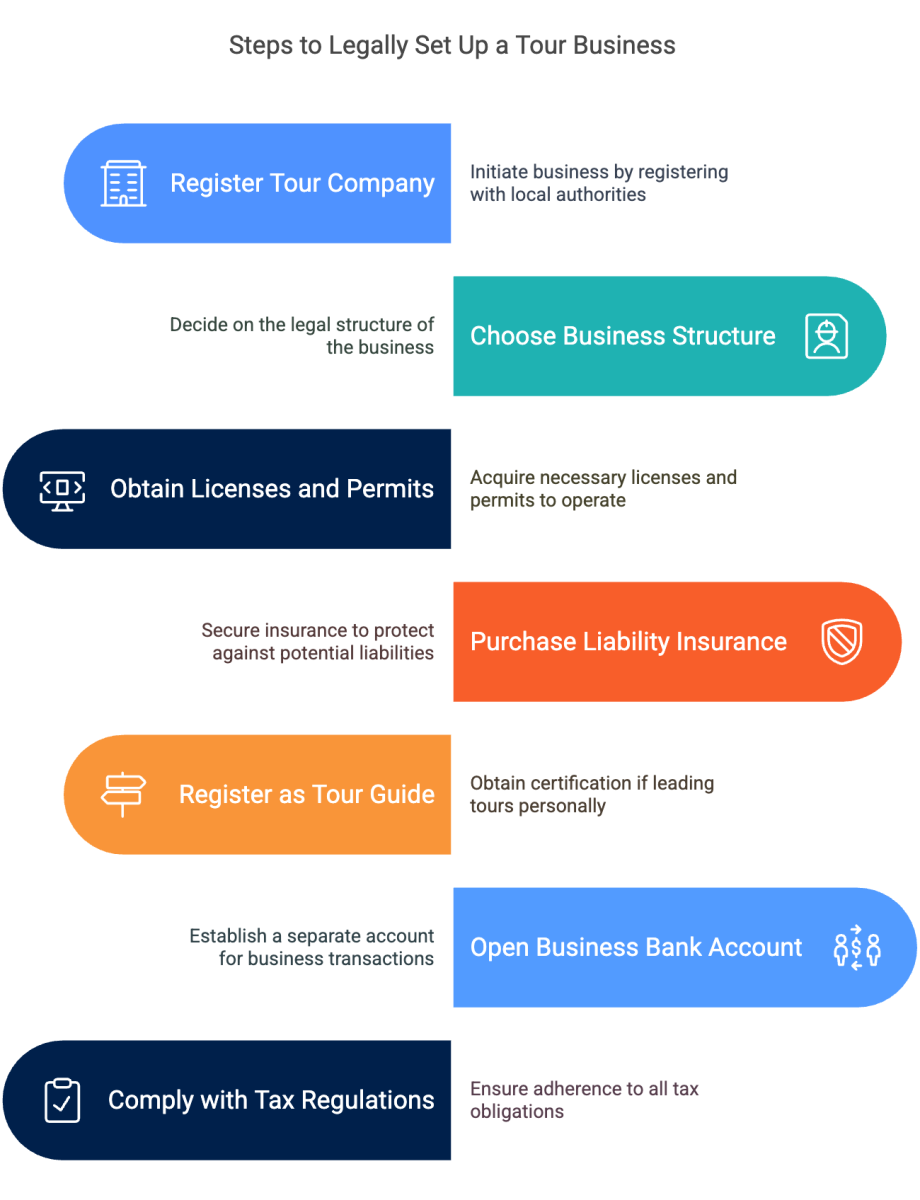
1. Register Your Tour Company
Once you’ve decided to start your tour business, the first official step is registering your company. This process can vary depending on your location, but it’s important to know the requirements specific to your area. Start by contacting your local tourism board or regulatory body to get guidance on local laws for tour operators. Regulations differ based on the type of tours you offer (walking tours, bus tours, adventure tours, etc.), so it’s important to ensure compliance from the outset.
When it comes to choosing a business name, make sure it’s both unique and descriptive of the experiences you offer. Your business name will be used on all your legal documents and marketing materials, so it should represent your brand clearly. Additionally, ensure that the name is available for domain registration, which will be vital for your website. Once you’ve settled on a name, you can submit it for approval to your local Registrar of Companies and secure your domain name.
2. Choose Your Business Structure and Register Your Business
After naming your business, it’s time to decide on the structure of your company. The most common options for small businesses are sole proprietorships, partnerships, and corporations. Each structure has different tax implications and legal responsibilities, so it’s important to consult with a small business accountant or lawyer to understand the pros and cons of each option.
- Sole Proprietorship: This is the simplest business structure, where you operate the business as an individual. It’s easy to set up but offers no personal liability protection.
- Partnership: If you’re starting the business with a partner, a partnership allows you to share the profits and liabilities.
- Corporation: This offers personal liability protection but comes with more complex regulations and tax considerations.
By consulting with an accountant, you can better understand which option is best suited for your goals and ensure that your business is set up for long-term success. Zaui’s flexible platform supports all types of business structures, allowing you to manage your tours and bookings efficiently, no matter how you register.
3. Obtain Your Business License and Permits
Once your business is officially registered, you’ll need to obtain the necessary licenses and permits to legally operate. This will typically involve applying for a local business license from your municipality. Depending on your location, additional permits might be required, especially if you plan to transport guests as part of your tour business.
For example, if you’re using vehicles for tours, you may need special permits related to vehicle inspections, driver certifications, or insurance. If you operate in certain tourist-heavy areas, you might also need specific permits for public tours or event space use. Your local municipality or tourism board will provide the necessary steps to ensure compliance.
4. Purchase Liability Insurance
Protecting your business and your guests is a top priority in the tourism industry. Accidents and unexpected events can happen, so it’s crucial to have the right insurance coverage to protect yourself from legal and financial liabilities. Meeting with an insurance agent will help you understand what coverage is necessary for your specific business. Some commonly required insurance policies for tour operators include:
- Commercial General Liability (CGL): This insurance protects your business from claims arising from injuries or property damage during the tour.
- Property Insurance: If you own property such as office space or vehicles used in your tours, property insurance will protect those assets.
- Accounts Receivable Insurance: This helps protect your business in case of a client’s non-payment for tours or services provided.
By investing in the right insurance policies, you’ll reduce risks and ensure that you’re financially protected in case of unforeseen events. Zaui’s platform integrates easily with third-party insurance providers to give you a streamlined way to manage your business operations, from bookings to accounting.
5. Register as a Tour Guide (If Applicable)
If you plan on leading the tours yourself, you may need to become a licensed tour guide, depending on the regulations in your area. Many cities or regions require tour guides to complete a certification or licensing course before they can guide tourists through designated areas.
To find out if you need to register as a tour guide, contact your local tourism board or regulatory body. They can provide information on whether certifications are necessary for your specific business model. Obtaining the proper certifications not only ensures you comply with local laws but also adds credibility to your services, making potential customers feel more confident in booking with you.
Zaui can help you manage your tour guide staff, and automate scheduling, making it easier to ensure that it all goes smoothly.
6. Open a Business Bank Account
Once your business is officially set up, it’s essential to open a separate business bank account. Mixing personal and business finances can lead to confusion and legal complications down the road. Having a business bank account will help you keep track of your revenue, expenses, and taxes more efficiently, making accounting easier and ensuring that your business is financially organized.
When you open your business bank account, you’ll need to provide documentation such as your business registration, tax identification number, and proof of your business license. A dedicated business account will also make it easier for you to manage payments, especially as you begin receiving bookings through your Zaui-powered website.
7. Comply with Tax Regulations
Every business must comply with tax regulations, and understanding your obligations is key to avoiding legal issues. Consult with a tax professional to understand how much to set aside for sales tax, income tax, and any other applicable taxes based on your business structure and location.
Many small business owners use accounting software or services to track taxes and file returns. Zaui’s system can help you integrate with accounting tools to keep track of your business finances, ensuring that your tax obligations are met accurately and on time.
8. Set Up Your Operations
Now that the legal foundations are in place, you can turn your focus to managing the operational aspects of your tour business. Zaui platform allows you to manage bookings, customer data, and payments all in one place. You can create a seamless experience for your customers, from booking their tours online to receiving tickets and confirmations instantly.
Ensure your operations are as efficient as possible by integrating your legal, financial, and tour management systems. Zaui helps streamline this process, saving you time so you can focus on growing your business and delivering exceptional experiences to your customers.
Starting a tour business involves more than just offering exciting tours, it requires attention to detail when it comes to legal compliance, business registration, insurance, and operational efficiency. By following these steps, from naming your business to obtaining the proper licenses and insurance, you’ll set a strong foundation for your success.
With the help of Zaui’s powerful platform, you can simplify the process of managing bookings, payments, and customer communications, ensuring that your focus stays on providing top-notch experiences for your guests. Stay organized, stay compliant, and watch your tour business thrive in a competitive market.
Launch Your Tour Business
Launching your tour business is an exciting and rewarding experience. Once your legal setup is complete, it's time to turn your attention to promoting and operating your business. With everything in place, you can now focus on delivering exceptional experiences for your customers while ensuring smooth operations behind the scenes.
Start by promoting your launch across multiple channels, including social media, your website, and OTAs. Use Zaui’s tools to streamline your booking process, making it easy for customers to find your tours, check availability, and book directly. By listing your tours on platforms like Viator, and GetYourGuide, you can expand your reach and increase visibility. These OTAs already have a large customer base and marketing resources, giving you a boost in attracting travelers actively looking for unique experiences.
Keep building your network by attending industry events, collaborating with influencers, and connecting with other tour operators. Word of mouth, customer reviews, and strong relationships will help your business grow over time. Zaui’s integrated system ensures you stay organized and responsive, managing bookings, customer inquiries, and financial data from one place.
As you launch your tour business, remember that success comes from a combination of legal readiness, strategic marketing, and excellent customer service. By staying organized, utilizing the right tools, and focusing on what sets your tours apart, you’ll build a thriving business that attracts loyal customers and fosters a positive reputation. With Zaui’s help, you’ll have the operational support to focus on creating unforgettable experiences for your guests while scaling your business effectively.
Related Posts

What to Look for in a Travel Booking Software in 2026
Discover the essential features to consider when selecting a travel booking software in 2026 to streamline your travel booking process and enhance customer experience.
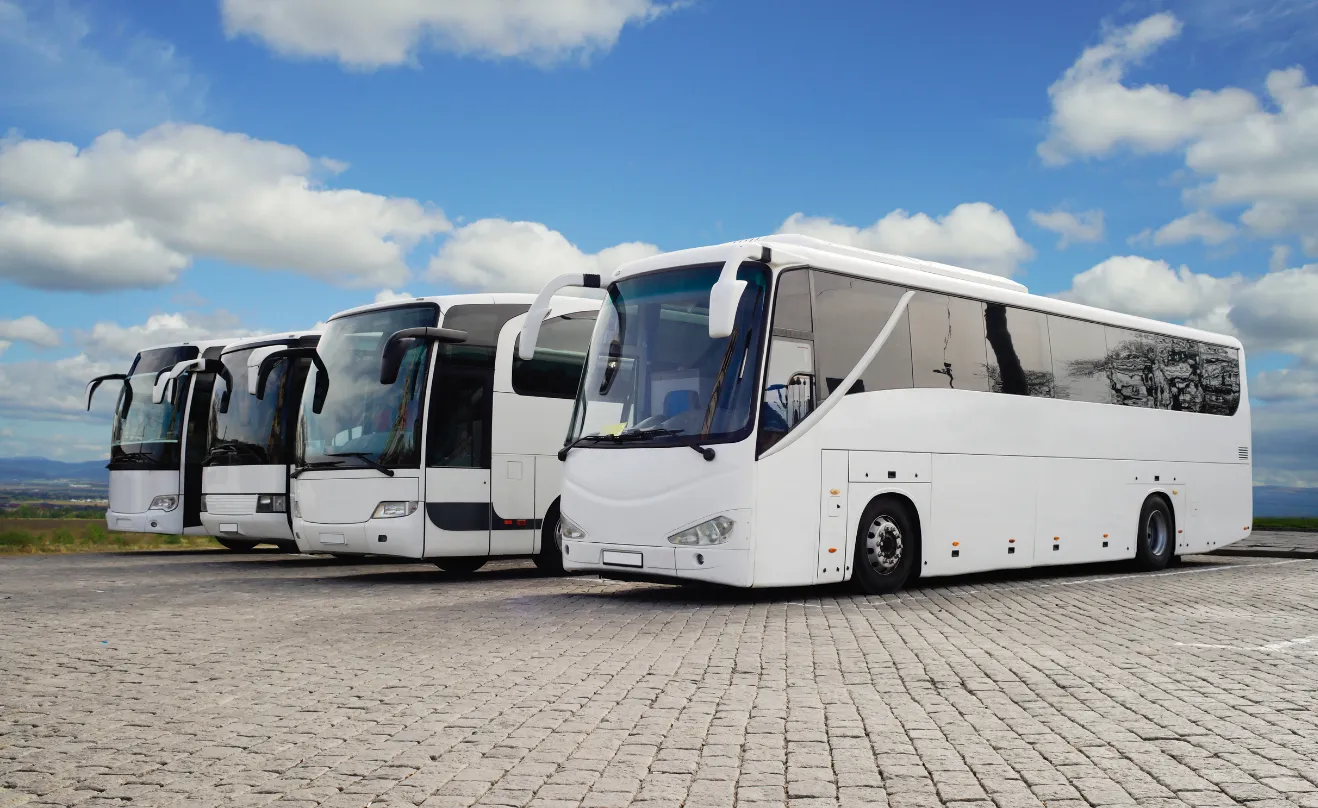
How Bus Travel and Ticketing Services Are Going Digital: A Look at the Modern Passenger Journey
Discover how Bus Travel and Ticketing Services are going digital for a smoother, smarter passenger journey. Explore the latest innovations today!


Frequently Asked Questions
No. Zaui’s pricing is fully pay-as-you-go. You aren’t locked into any long-term contract. In fact, leading platforms emphasize this flexibility. Similarly, Zaui lets you start and stop anytime. You can change or cancel your plan freely, so you only pay for what you use.
Absolutely not. Zaui’s pricing is 100% transparent. We disclose all fees up front with no surprise add-ons or “sneak-in” charges. In fact, Zaui’s plans include all core features “without additional fees”. Industry experts note that hidden fees undermine trust so we avoid them entirely. All costs are clearly outlined in our pricing, and there are no extra setup charges or undisclosed surcharges at checkout.
Zaui integrates with major payment gateways (e.g. Stripe) so you only pay standard credit-card processing rates (roughly 1.9%+$0.30/transaction) and we don’t mark them up. Only the published platform commission is added on bookings. You also have full control over who pays the commission, we let you decide whether to absorb booking fees or pass them on to customers. In short, you’ll only pay the transparent booking commission and normal gateway fees, nothing extra.
Your onboarding and support are included in the price. We provide white-glove setup help and ongoing 24/7 support at no additional cost. Our dedicated customer-success team will guide you through every step, ensuring a smooth launch. You won’t pay extra for training or service other than the onboarding fee; it's all built into your plan.
You can schedule a free demo with our team. Our Zaui ninjas will walk you through pe how Zaui can work for your business and highlight opportunities to grow with our advanced features all without any upfront payment. This way, you can feel confident it’s the right fit before making a commitment.
Of course. Zaui’s plans are fully flexible. You can upgrade or downgrade at any time to match your needs, without penalties. You can move to a higher tier or back down easily, and your billing adjusts automatically.
No. Zaui does not charge its commission on offline/manual bookings. “No fees on offline bookings” You only pay the commission when a booking is processed online through our system. Manual reservations (or bookings from partner channels we set up for you) incur no extra platform fee. (30% or less)
All of Zaui’s core features are included in your plan at no extra charge. We believe in value and transparency: Zaui provides over 15 advanced features (Google Things to do, reporting tools, marketing tools, reports, etc.) at no additional cost. Many competitors charge extra or require higher plans for the same features, but with Zaui you get the full suite of tools in one package. Any optional add-ons (if any) will always be clearly listed and optional there are no surprise paid upgrades for standard features.
Each Zaui plan is designed for clarity and fairness, following industry best practices. You can trust that our pricing is transparent and flexible, with the support you need built in.
Extra accounts- unlimited agents, resellers, user




